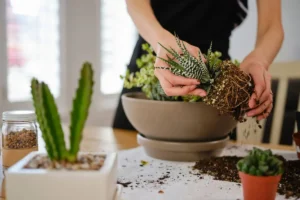Gardening is a beautiful hobby with many benefits. It helps you relax, de-stress, and connect with nature. In addition, gardening is an excellent way to produce fresh, healthy produce. If you’re new to gardening, starting a vegetable garden can seem like a daunting task. However, with a little planning and preparation, you can create a thriving garden that produces fresh, healthy produce throughout the season.
Table of Contents
Choosing a location
The first step in starting a vegetable garden is choosing a location. You should choose a location that gets at least 6-8 hours of sunlight per day. Additionally, you need to choose a well-drained surface. If your soil is clay-like, you should amend it with compost or other organic matter to improve drainage. You also want to choose a location that is comfortable to access and maintain.
Preparing the garden
Once you have chosen a location, it is time to prepare your garden. Here are some things to consider when designing your garden:
- Garden Size: How big do you want your garden to be? Start small, especially if you are new to gardening. You can always expand your garden in the future.
- How to Garden: Will your garden be in raised beds or in the ground? How is it obtained? You can create a traditional rectangular garden or a more organic shape.
- Choose plants: What agenda do you want to plant? Find out how much space and sunlight each plant needs. You also need to think about the type of vegetables you and your family like to eat.
Preparing the soil
Before you start planting, you need to prepare the soil. This means removing any weeds, rocks, or other debris from the garden bed. The soil should also be loosened with a fork or garden tiller. This makes it easier for your plants to root and absorb nutrients.
After you loosen the soil, you need to amend it with compost or other organic matter. It improves soil fertility and structure, which helps your plants grow and thrive.
Planting a garden
Now is the time to plant your garden. Here are some tips for growing your vegetables:
- Follow growing instructions:
Each vegetable has different growing instructions. Follow the instructions on the seed packet or plant label to make sure you are growing your vegetables correctly.
- Plant at the right depth:
Make sure you plant your seeds at the right depth. This varies from plant to plant, so read the instructions carefully.
- Frequent watering:
Your plants need water to grow, so you need to water them frequently. Try to water your plants liberally once a week instead of lightly every day.
- Fertilizing:
Fertilizing promotes drainage, reduces weeds, and helps regulate soil temperature. Apply a layer of mulch around your plants after planting.
Maintaining the garden
After you plant your garden, you need to take care of it. This means regular watering, fertilizing, and weeding. Here are some tips for taking care of your garden:
- Deep watering:
As mentioned earlier, aim to water your garden liberally once a week. It encourages deeper root growth and helps your plants form stronger roots.
- Frequent Fertilizer:
Your plants need nutrients, so you need to fertilize your garden regularly. You can use organic fertilizers or compost to add nutrients to the soil. Follow the instructions on the fertilizer package or compost bin to make sure you are using the correct amount.
- Regular Weeds:
Weeds compete with your plants for nutrients and water, so it is important to weed your garden regularly. Try pulling weeds by hand instead of using herbicides because herbicides can harm insects and beneficial wildlife.
- Monitor for pests and diseases:
Keep an eye on your plants for signs of pests or disease. Early detection can prevent the spread of pests and diseases to other plants. If you notice problems, try using natural remedies like pesticide soap or neem oil before using pesticides.
- Harvesting your vegetables:
Once your vegetables are ready for harvesting, make sure you do it regularly. This encourages your plants to produce more vegetables and prevents overripe or rotten produce from attracting pests and diseases.
The Conclusion
Starting a vegetable garden can be a rewarding and fulfilling experience even for beginners. By choosing the right location, preparing your garden, preparing the soil, planting your vegetables, and maintaining your garden, you can create a thriving garden that produces fresh, healthy produce all season long. Remember to start small, be consistent with your care, and enjoy the fruits of your labor. Happy gardening!
FAQ’s
Here are some of the most frequently asked questions about starting a vegetable garden for beginners:
Q. How much space do I need for a vegetable garden?
The space you need for a vegetable garden depends on how many vegetables you want to grow and how much space each plant needs. If you are new to gardening, it is best to start small with a garden bed of 1.2 meters wide and 8 meters long.
Q. Which vegetables are easiest to grow for beginners?
Other easy-to-grow crops for beginners include tomatoes, cucumbers, zucchini, corn, lettuce, and herbs like basil and parsley. These vegetables require low care and maintenance and can be grown in small spaces such as containers or raised beds.
Q. Should I start my vegetable garden from seed or can I buy seedlings?
You can start your vegetable garden from seed or buy plants from a garden center. Starting from seed is costly and gives you a lot of variety, but it takes a lot of time and effort. Buying plants is great, but expensive.
Q. How often should I water my vegetable garden?
Your vegetable garden should be heavily watered once a week rather than daily. It encourages deeper root growth and helps your plants form stronger roots. However, if you live in a hot or dry climate, you may need to water your garden more frequently.
Q. How can I control pests and diseases in my vegetable garden?
Pest and disease control in your vegetable garden starts with maintaining healthy soil and plants. Keep your soil moist and nutrient-rich, and keep your plants healthy with regular fertilizing, weeding, and watering. You can also use natural remedies like pesticide soap or neem oil to prevent pests and diseases from taking hold in your garden.
Q. What should I do with my vegetable garden at the end of the growing season?
At the end of the growing season, you should clean your garden bed by removing dead plants and debris. You can also add compost or other organic matter to prepare the soil for the next growing season. Mulching also helps protect the soil from erosion and retain moisture in winter.




Add Comment